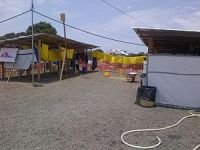Ebola: UN sets December 1 deadline
The United Nations Organization has set a deadline to bring the Ebola Virus Disease under control - December 1 is the date set, with one of the main focuses being burials, where at least 20 per cent of new infections occur, due to direct contact with the body. The focus is to encourage religious rites but under safe healthcare guidelines.

The World Health Organization (WHO) claims that at least one fifth of new infections with Ebola Virus Disease occur during the burial process, due to rites which involve washing the body and touching it with the palms of the hands, at a time when it is still highly infectious, or else distributing property which has become infected with the virus. Therefore a new protocol regarding the burial process is to be implemented as one of the main focuses of the plan to bring the outbreak under control by the beginning of December.
The "New WHO safe and dignified burial protocol" is described by the World Health Organization as being "a key to reducing Ebola transmission" and emphasizes the inclusion of family members in the entire burial process, encouraging religious rites under safe guidelines
"Introducing components such as inviting the family to be involved in digging the grave and offering options for dry ablution and shrouding will make a significant difference in curbing Ebola transmission," states Dr. Pierre Formenty, an Ebola expert working with the WHO.
The new protocol has been developed by an interdisciplinary team from the WHO, working in partnership with the International Federation of Red Cross and Red Crescent Societies (IFRC) and faith-based organizations (including World Council of Churches, Islamic Relief, Caritas Internationalis and World Vision). It provides step-by-step guidelines for safe practices and dignified burials, including the family and local clergy in the process from preparation of the burial, to digging the grave and placing the body inside, prepared both for Muslim and Christian burial rites. There are twelve steps that burial teams have to follow.
"Giving the family an opportunity to view the body of the deceased, ensuring that the grave is appropriately labelled, and allowing religious leaders to offer prayers and family members the option to throw the first soil - these are important incentives for encouraging families to continue to find strength in their faith, and to keep other family members safe from becoming infected," (Rev. Msgr. Robert J. Vitillo, Head of Delegation, Caritas Internationalis).
"It is clear from Islamic juristic ruling that the necessity of religious washing of the body before burial of patients who die from Ebola is over-ruled," (Rehanah Sadiq, a Muslim chaplain with University Hospitals Birmingham NHS Foundation Trust who served as consultant to WHO on the protocol).
Frontline healthcare workers in the worst affected regions of the Republic of Guinea, Liberia and Sierra Leone have been doubled in number, from 300 to 600, guaranteeing that supplies are reaching those affected and implementing social awareness programs among the population.
Sources: WHO, UNO
Timothy Bancroft-Hinchey
Pravda.Ru
Subscribe to Pravda.Ru Telegram channel, Facebook, RSS!


